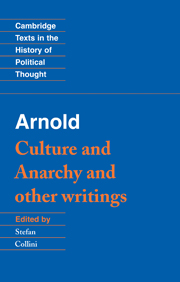Book contents
- Frontmatter
- Contents
- Introduction
- Chronology
- Bibliographical note
- Note on the texts and acknowledgements
- DEMOCRACY (1861)
- THE FUNCTION OF CRITICISM AT THE PRESENT TIME (1864)
- CULTURE AND ANARCHY: AN ESSAY IN POLITICAL AND SOCIAL CRITICISM (1867–9)
- Introduction
- 1 Sweetness and Light
- 2 Doing as One Likes
- 3 Barbarians, Philistines, Populace
- 4 Hebraism and Hellenism
- 5 Porro Unum Est Necessarium
- 6 Our Liberal Practitioners
- Conclusion
- Preface to Culture and Anarchy (1869)
- EQUALITY (1878)
- Index
- Cambridge Texts in the History of Political Thought
Introduction
Published online by Cambridge University Press: 05 June 2012
- Frontmatter
- Contents
- Introduction
- Chronology
- Bibliographical note
- Note on the texts and acknowledgements
- DEMOCRACY (1861)
- THE FUNCTION OF CRITICISM AT THE PRESENT TIME (1864)
- CULTURE AND ANARCHY: AN ESSAY IN POLITICAL AND SOCIAL CRITICISM (1867–9)
- Introduction
- 1 Sweetness and Light
- 2 Doing as One Likes
- 3 Barbarians, Philistines, Populace
- 4 Hebraism and Hellenism
- 5 Porro Unum Est Necessarium
- 6 Our Liberal Practitioners
- Conclusion
- Preface to Culture and Anarchy (1869)
- EQUALITY (1878)
- Index
- Cambridge Texts in the History of Political Thought
Summary
In one of his speeches a short time ago, that fine speaker and famous Liberal, Mr. Bright, took occasion to have a fling at the friends and preachers of culture. “People who talk about what they call culture!” said he, contemptuously; “by which they mean a smattering of the two dead languages of Greek and Latin.” And he went on to remark, in a strain with which modern speakers and writers have made us very familiar, how poor a thing this culture is, how little good it can do to the world, and how absurd it is for its possessors to set much store by it. And the other day a younger Liberal than Mr. Bright, one of a school whose mission it is to bring into order and system that body of truth with which the earlier Liberals merely fumbled, a member of the University of Oxford, and a very clever writer, Mr. Frederic Harrison, developed, in the systematic and stringent manner of his school, the thesis which Mr. Bright had propounded in only general terms. “Perhaps the very silliest cant of the day,” said Mr. Frederic Harrison, “is the cant about culture. Culture is a desirable quality in a critic of new books, and sits well on a professor of belles-lettres; but as applied to politics, it means simply a turn for small fault-finding, love of selfish ease, and indecision in action.
- Type
- Chapter
- Information
- Arnold: 'Culture and Anarchy' and Other Writings , pp. 55 - 57Publisher: Cambridge University PressPrint publication year: 1993



